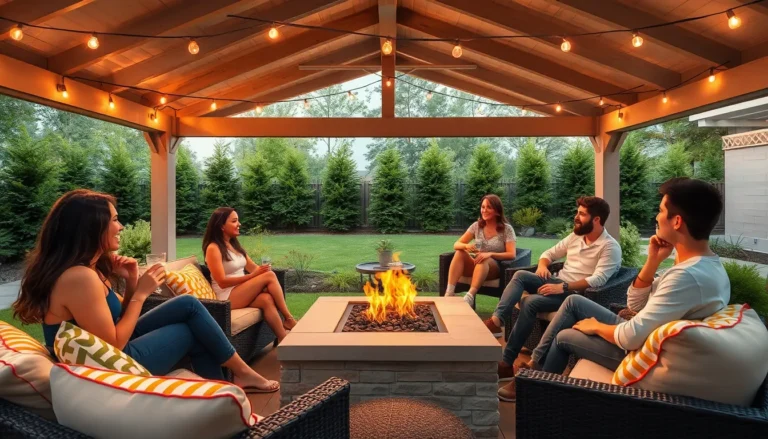Table of Contents
ToggleFinding the cheapest home insurance company can feel like searching for a needle in a haystack—if that haystack were made of confusing policies and endless quotes. But don’t worry! With a little guidance, homeowners can navigate this maze and save some serious cash. After all, who wouldn’t want to protect their castle without breaking the bank?
Understanding Home Insurance
Home insurance protects homeowners from financial losses associated with their property. This type of insurance covers various risks, including damage to the home and personal belongings.
What Is Home Insurance?
Home insurance refers to a contract between a homeowner and an insurance company. It provides coverage for property damage caused by disasters, theft, or accidents. Policies vary in terms of coverage types, limits, and premiums, allowing homeowners to select plans that fit their needs. Typical coverages include dwelling protection, personal property protection, liability coverage, and additional living expenses. Homeowners may choose to enhance basic coverage with endorsements or riders for specific risks.
Why Do You Need Home Insurance?
Home insurance offers vital financial security for homeowners. Without it, homeowners might face substantial out-of-pocket costs in the event of a disaster. Mortgage lenders often require home insurance to protect their investment in the property. Coverage protects against theft, fire, and natural disasters, minimizing financial burdens during emergencies. Liability coverage within these policies protects against lawsuits resulting from injuries that occur on the property. Safeguarding valuable possessions and ensuring peace of mind make home insurance a crucial aspect of responsible homeownership.
Factors Affecting Home Insurance Costs

Various factors influence home insurance costs. Understanding these can help homeowners find the most affordable options.
Location
Location significantly affects home insurance premiums. Areas prone to natural disasters, such as hurricanes or earthquakes, tend to have higher rates. Urban regions often see elevated costs due to increased theft and vandalism risks. Insurance companies assess the crime rate and the vulnerability of structures in specific neighborhoods. Proximity to a fire station or fire hydrant can lower rates, as these factors can enhance property safety and reduce response times during emergencies. Homeowners should evaluate local risks to anticipate potential insurance costs.
Property Value
Property value is another critical element in determining insurance costs. Higher valued properties usually incur higher premiums because they require greater coverage. The replacement cost of the home, not market value, is the standard measure for determining the policy amount. Upgrades such as modern kitchens, swimming pools, or elaborate landscaping can elevate replacement costs further. Homeowners should consider these factors when assessing their property’s insurance needs, as an accurate valuation ensures adequate coverage while potentially lowering unnecessary expenses.
Coverage Options
Coverage options substantially impact home insurance pricing. Basic policies cover only essential elements, while comprehensive policies include additional protections like personal liability or extended dwellings. Homeowners may opt for add-ons that address specific risks, such as natural disasters or theft. Each additional coverage layer increases the premium, so it’s crucial to balance affordability with adequate protection. Understanding these options allows homeowners to tailor their policies to their unique circumstances, ensuring both comprehensive coverage and cost-effectiveness.
Top Cheapest Home Insurance Companies
Finding affordable home insurance can significantly reduce costs while maintaining essential coverage. Below are three top companies known for offering cost-effective home insurance solutions.
Company A
Company A stands out for its competitive rates and excellent customer service. With an average annual premium of $1,200, this provider offers a range of discounts for bundling policies and maintaining a claim-free record. Coverage options include dwelling protection, personal property insurance, and liability coverage. This company’s user-friendly online platform simplifies the quoting process, allowing homeowners to receive instant quotes tailored to their needs.
Company B
Company B features an appealing average annual premium of $1,150, making it a budget-friendly choice. Its policy offerings encompass various options, including customizable coverage limits to suit individual preferences. Customer reviews often highlight the company’s prompt claims handling and dedicated customer support. Bundling home and auto insurance can lead to additional savings, enhancing the overall appeal for potential policyholders.
Company C
Company C offers an impressive starting average premium of $1,100, showing a commitment to affordability. Customers appreciate the ability to modify coverage levels according to budgetary constraints. The company prioritizes transparency, providing clear information about policy terms and conditions. Many homeowners opt for this provider due to its reputation for reliable, prompt claims processing and helpful resources for policy management.
Tips for Finding Affordable Home Insurance
Finding affordable home insurance requires careful planning and strategic decision-making. Homeowners can explore several practical ways to lower their insurance premiums while ensuring adequate protection.
Compare Quotes
Collecting multiple quotes remains essential for identifying the best rates. Homeowners benefit from using online comparison tools to easily review offers from various companies. In addition, some insurers provide instant quotes, allowing for quick assessments. It’s prudent to compare coverage levels because lower premiums may come with reduced protections. Finding the right balance between cost and coverage frequently leads to considerable savings.
Consider Bundling Policies
Bundling home insurance with other types of insurance often results in significant discounts. Many providers offer benefits for combining policies, such as auto and home insurance. These discounts typically range from 5% to 25%, depending on the insurer. Homeowners should ask about available bundling options since they can maximize savings. Ultimately, choosing to bundle ensures comprehensive coverage under one policy while reducing overall costs.
Improve Your Home Security
Enhancing home security often leads to lower insurance premiums. Installing security systems, deadbolts, or smoke detectors can reduce risk and attract discounts from insurers. Companies frequently reward policyholders who take proactive measures to protect their homes. Homeowners may also want to evaluate their current security features and consider upgrades. Simple improvements not only enhance safety but also contribute to long-term savings on insurance costs.
Finding the cheapest home insurance company doesn’t have to be a daunting task. By understanding the factors that influence premiums and taking proactive steps like comparing quotes and improving home security, homeowners can secure affordable coverage that meets their needs. The highlighted companies provide excellent options with competitive rates and reliable customer service. Prioritizing both cost and adequate protection ensures peace of mind while safeguarding valuable assets. With the right approach, homeowners can navigate the insurance landscape effectively and enjoy financial security in their homes.




